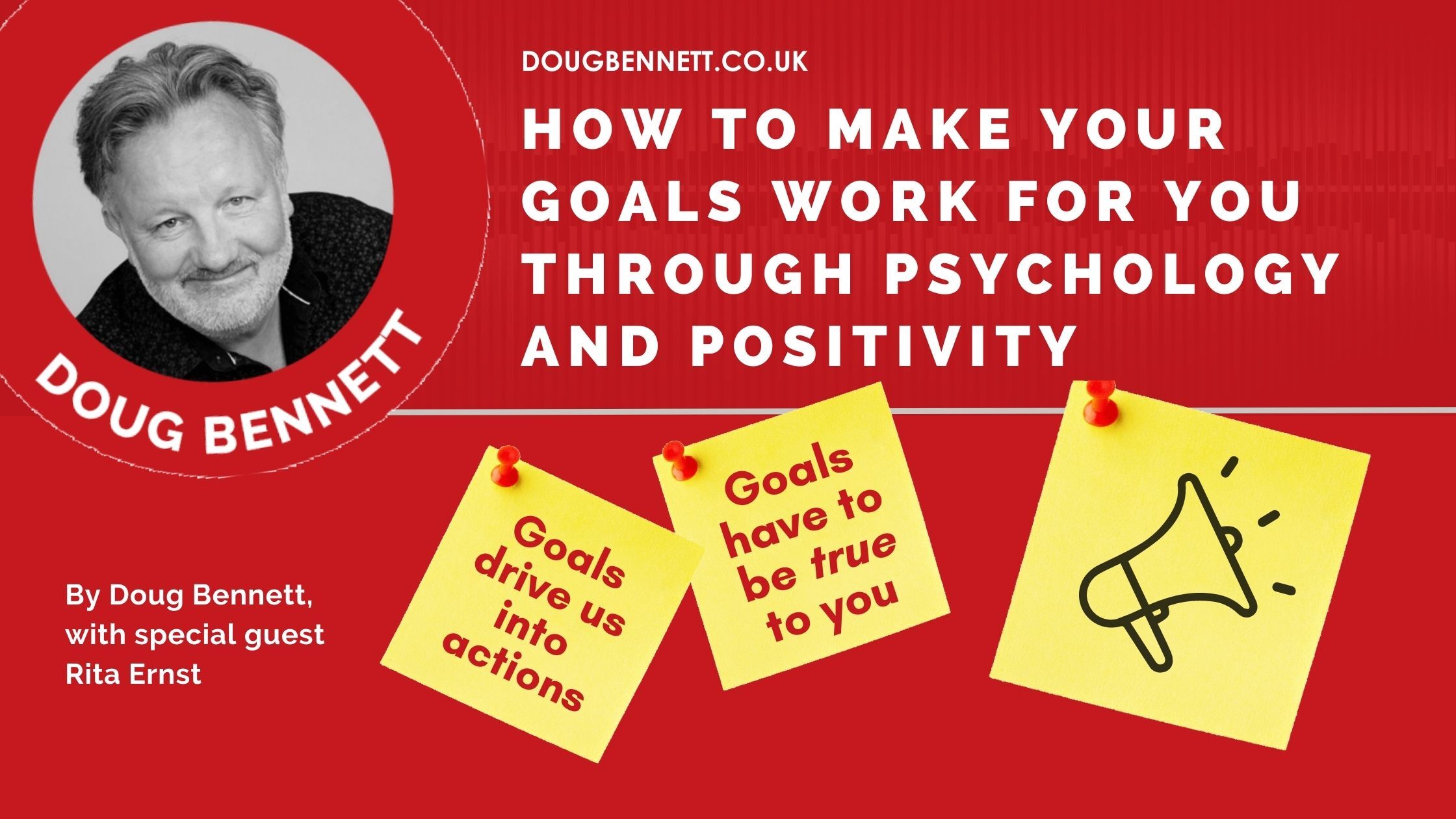How To Make Your Goals Work For You Through Psychology And Positivity

By Doug Bennett aka The Goals Guy® with special guest Rita Ernst
We’ve all experienced that random burst of energy at 3am – the sudden urge to chuck everything out, get your life together, and write out your goals for the future. Acting on this impulse and setting these goals can feel very motivating, no doubt. But have you ever wondered about the science behind this and how to actually make these goals happen?
I recently chatted with fellow author and positivity influencer Rita Ernst on the Goals Do Come True podcast (click here to listen). Rita is an organisational psychologist who’s passionate about igniting positivity at work to improve performance, wellbeing and workplace culture.
In this blog, I’m sharing some of Rita’s nifty hacks for understanding the psychology behind goal setting and how to make your goals work for you.
Why writing down your goals actually works
I’ve shared in previous blogs and podcasts how setting my goals and writing them down on a day-to-day basis made a tremendous difference in my life. I was able to move from the brink of bankruptcy to propelling my business to seven figures.
It’s not merely coincidence or a stroke of luck. As Rita says, there’s real science behind this phenomenon that links goal setting to motivation and, ultimately, success.
Rita: “I know from psychology that goals are motivating. When we have purpose and intention, we tend to be more motivated. As we verbalise our goals either by speaking or writing them down, we’re slowing our brains down and taking full ownership of those ideas.
I’m currently in the middle of a big hairy audacious goal which is having a million people discover and connect with my book in the Show Up Positive movement. I’ve created an email list – a tribe of sorts – and then I constantly list out my micro goals which add up to the big goal. I speak them aloud and share them with my tribe. Doing this makes me more conscious of my goals and holds me accountable.”
The power of connection
As tempting as it might be to just speak aloud and let the universe – or a fairy godmother somewhere – do its thing, it doesn’t just end at having a big, juicy, audacious goal. For goals to act as real motivating drivers in your life, they have to be aligned with your personality and vision. They have to be true to you.
Rita: “One observation I’ve picked up from spending a lot of time in corporate America is that in many cases, goals are discounted in our minds. We discount them because we go through a mechanical goal-setting process. We’re putting things on paper to satisfy somebody else without placing sufficient focus on actually satisfying ourselves. But when we set goals that are aligned with our drive and the things that matter to us – when we can connect our personal meaning to these goals, it becomes more real for us.
In most workplaces, we transfer these goals and strategic plans from the top of the organisation down to every worker, but we don’t really have connectivity. They can’t feel these goals or own them and that’s where the problem lies. Connectivity has to be present in order for goals to be real motivating drivers in your life.”
The three keys to motivation: what you need to make your goals work for you
Rita has identified three essential psychological elements that need to be present for our goals to drive us into action, especially in codependent work structures:
1. Autonomy
Rita: “Autonomy is essentially the freedom to operate in ways that make sense to us. Let’s picture a typical workplace scenario. You get this goal handed to you – a goal that you have no real connection with. In this scenario, you lose some autonomy because you don’t have the freedom to create a connection with that goal and build achievement strategies aligned with your personal drive and vision. This explains why many performance management systems are designed in such a way that people can write their own goals. Once you understand the context of your job and what you’re supposed to be contributing collectively, you’ll automatically want the freedom to figure out how to do that.”
2. A feeling of competence
Rita: “More often than not, people want to feel that they have the skills, experience and the knowledge necessary to make a significant contribution. If you ask somebody to take on a goal that they are not prepared to do without providing adequate support, they’ll feel set up for failure. Subsequently, they’ll withdraw. A huge part of the quiet quitting conversation revolves around the fact that people are tired of having to bootstrap it themselves, especially since they don’t get any appreciation for levelling up.”
3. Relatedness
More often than not, we tend to feel discontent with our lives because we feel like we’re not getting the affirmation and appreciation we deserve. While these feelings are valid, you can kickstart a ripple of positivity and motivation just by forming a positive connection with people.
Rita: “The third key is relatedness which is a deep connection to the people around you. This connection comes from an exchange of positivity, respect and appreciation. There is an activity in my Show Up Positive workshops that I do over and over again, where people write notes of gratitude to at least three other people in the group. We then go around the circle and read it out loud. I encourage my clients to make it a regular practice – to write something positive on a sticky note everyday and hand it off to somebody. It doesn’t have to be something monumental.
And we can do that with goals too. While it’s important to have a big, hairy, audacious goal, these little micro goals can be just as powerful and just as important.”
One of the success formulas I love to highlight and apply to my daily life is Jack Canfield’s – Event + Reaction = Outcome. Events will naturally occur – events that may thwart your progress or stand in your way. You may decide to respond positively or negatively but the former will most likely lead to a positive outcome.
Moving forward
Rita has a final nugget that encapsulates the key to making your goals work for you.
Rita: “You can’t set goals because your boss or your parents want you to have them – or simply because you think those goals are what you’d expect from the person you want to be. It needs to make sense to you and only then will you have the sustained energy to bring it to fruition.”
Like Rita says, having an audacious goal isn’t enough to gain traction and move ahead. It’s integral that you do a bit of introspection and make sure it’s true to you and only you. If you want to see real impact, you’ve got to have a deep connection with that goal – it has to make sense in your head, heart and hands.
How strongly do you feel about your goals? Are they truly yours – infused into your heart and soul – or do you feel like they’re a replica of someone else’s hopes and dreams? I’d love to hear more about it! Drop me a line at doug@dougbennett.co.uk and share your thoughts.
If you’d like to skip the fluff to get more clarity for your goals and smash them, please click here to book a complimentary discovery call with me.




